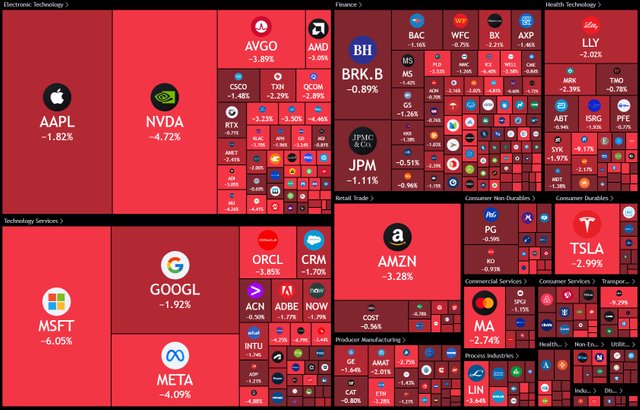In a staggering turn of events, the U.S. stock market experienced a massive sell-off that wiped out nearly $953 billion in market value. This sudden loss reflects the vulnerability of the market amidst increasing fears of an economic downturn and potential recession. Let's explore what led to this significant downturn and its implications for investors.

Factors Behind the Market Crash
Escalating Recession Concerns: One of the key triggers behind the market sell-off was heightened fears of a looming recession. Recent economic data has been far from reassuring. The unemployment rate surged to 4.3%, with the number of jobs added to the economy falling short of expectations. This has heightened investor fears that the Federal Reserve may need to take drastic measures to stabilize the economy, including potentially cutting interest rates sooner than anticipated.
Weak Manufacturing Data: Adding fuel to the fire, the U.S. manufacturing sector experienced an unexpected contraction. The Purchasing Managers' Index (PMI) for manufacturing fell to 49.5, signaling a drop in activity. This decline, which came in below expectations, highlighted the struggles within the industrial segment and contributed to the overall market pessimism.
Tech Giants' Earnings Misses: The sell-off was also intensified by disappointing earnings from several major technology companies, particularly those belonging to the "Magnificent 7" group, which have driven much of this year’s gains. Tesla and Alphabet (Google's parent company) posted earnings below expectations, prompting a loss of investor confidence and a broad sell-off in tech stocks. The "Magnificent 7" alone saw a loss of over $3 trillion in market value in recent weeks.
Seasonal Weakness and Overbought Conditions: Analysts have pointed out that the current sell-off is also attributable to a combination of an overbought market and a seasonally weak period for equities. The markets had been rallying for much of the year, and some correction was expected, particularly in light of the high valuations. Ross Mayfield, an investment strategist, indicated that such pullbacks are "healthy corrections" within a bull market rather than a cause for panic.
Which Sectors Were Hit the Hardest?
The market crash was widespread, affecting almost all sectors. Consumer cyclical stocks, including Amazon, saw significant declines, while financial giants like JPMorgan Chase and Berkshire Hathaway also experienced losses. The energy sector wasn't spared either, with declines in major players like Exxon Mobil and Chevron, which underscores the broad-based nature of the sell-off.
Even traditionally defensive sectors such as healthcare and consumer defensive stocks faced setbacks. Companies like Procter & Gamble and Coca-Cola also saw notable declines. Overall, this sell-off wasn't confined to a single sector but was rather a widespread market reaction driven by economic uncertainties.
What Lies Ahead?
The future of the U.S. stock market remains uncertain. The combination of rising unemployment, a weakening manufacturing sector, and poor earnings reports suggests that economic conditions might be shakier than previously thought. Many analysts believe the Federal Reserve might consider lowering interest rates sooner to stimulate the economy, but this remains speculative.
On the brighter side, some experts see this correction as a positive, providing buying opportunities for investors who believe in the long-term growth of the market. Whether this marks the beginning of a prolonged downturn or a temporary correction remains to be seen, but the signals are clear—investors need to remain cautious and vigilant in the coming weeks.
Conclusion
The $953 billion loss in the U.S. stock market highlights growing concerns over a potential economic downturn and uncertainty surrounding key economic indicators. Investors should stay informed and consider their investment strategies carefully amidst this volatility.
The market's reaction has reminded us of the importance of diversifying portfolios and being prepared for corrections, which are a natural part of the economic cycle.
For further insights and ongoing updates on the financial landscape, stay tuned to trusted financial news platforms.
Upvoted! Thank you for supporting witness @jswit.
Downvoting a post can decrease pending rewards and make it less visible. Common reasons:
Submit